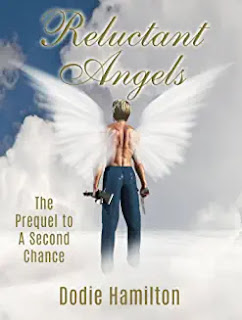Let’s start with the burning question… You’re known as a writer of alternative history thrillers featuring your modern Praetorian heroines, Carina and Aurelia. What made you go back to the 4th century to write about the founders of Roma Nova?
JULIA PRIMA was inspired by my readers. They wanted to know how and why the 21st century Roma Nova was established back in the 4th century. Most of all, they were more than curious about the people who had stood up for their values in the face of lethal threats and eventually torn themselves away from everything they knew.
Like any country Roma Nova has its own history. In our real timeline, who today doesn’t have an older relative who remembers ‘the war’? We know exactly which war they are talking about because it was such a formative experience for that generation and the following one. At school, we learn about 1066, American Independence in 1776, the Battle of Waterloo, events long in our past but which have an impact on our countries today. To give Roma Nova a depth and some collective memory, I invented a history for it with roots in real events in the 4th century.
In the rest of the Roma Nova series, even in the first hundred pages of INCEPTIO, the first Roma Nova thriller, the modern day characters often refer to Julia Bacausa and Lucius Apulius – their legendary ancestors – so when readers said they were thirsty for more, I knew I had to tell their story.
 |
| the Arch of Trajan at Carsulae on the Via Flaminia. |
Tell us about these ancestors
Julia
Bacausa, just twenty, is the passionate and independent (translation:
headstrong) daughter of the pagan Celtic ruler of the Virunum region in the
Roman province of Noricum (approximately present day Austria). She’s miserable
and tense after a failed marriage and although legally divorced under Roman
law, there is no religious annulment possible from her Christian ex-husband,
the local bishop’s nephew. Her father is wary of the growing political power
exerted by the new religion. If she re-marries now in Virunum, it would cause a
social and political uproar. She can see no future life for
herself, let alone any hope of love.
Lucius Apulius is in his mid-twenties, the son of a long-established senatorial family, but that’s a problem in itself. Emperor Diocletian’s reforms in the late Roman Empire reinforced the promotion of equites (roughly the lower tier of aristocrats/upper middle class) who were increasingly professionalised and taking over the military and administrative roles of governing the empire. Diocletian excluded the senatorial class from all senior military commands and from all top administrative posts except in Italy as he considered them entitled and useless. However, while true in numerous cases, some senatorial sons like Lucius (and his friend Gaius Mitelus) are nevertheless keen to serve and are making a success of military careers.
In fact, Lucius is a rising star on Count Theodosius’s staff, taking part in restoring order after a rebellion in Britannia. As a reward, he’s been promised his own command in a big step for a young, ambitious tribune. It would have made his career despite his family background. But because he refuses to convert to Christianity, he’s thrown out and posted to a backwater in the mountains of Noricum. And he’s still very angry about it
Writing two such uncompromising characters who are nevertheless sensitive human beings smarting from life’s unfairness is grist to the mill for any writer. In fact, part of the fun of writing is creating a raft of characters with vastly different personalities and watching them react with each other!
 |
| a travelling carriage |
How different is it from writing alternative history?
JULIA PRIMA is set in our historical timeline between AD 369 and 371 when the Roman world was riddled with religious strife and on the brink of transformation. That transformation hasn’t kicked off yet, but it’s hovering. No moment in history is fixed; it has its causes – direct and indirect – and its consequences – short term and long term. Behind the personal story of Julia and Lucius, this new book shows how the signs of decline are well and truly there and sets the scene for the start of the collapse (in the next book!)
Alternative history takes off from a point of departure (POD) triggered by an event, large or small. Writers should use the conditions prevailing at that point as the basis for developing their alternative timeline along historically logic lines. But essentially, you are writing in a void. With historical fiction, there are sources, both documentary and archaeological, sometimes sparse and often biased, but they are something available for reference and consultation, even though analysis of these sometimes causes strong arguments!
So, on the one hand, historical fiction writers have a skeleton, sometimes a whole body of research to mine for research. But opposite that, the good historical fiction writer is constrained by being obliged to search out and check with existing sources and in my opinion, not wander too far off verifiable facts. You can’t invent new Roman emperors, for example and retain credibility – we know who they all were!
Did
you encounter any special difficulties in your research?
Hahaha! Yes and no. No problem with the Roman side of things, but I did check on many individual things I thought I knew. Everything had moved on in the centuries since Augustus and Hadrian, from armour and military organisation to clothes and dining arrangements. But although I researched about trekking horses in the 4th century and knew about ‘no stirrups’, I was a little rocky on the practical aspects. So I consulted Helen! And I very much appreciated the input – thank you. Other ‘Romans’, such as Ruth Downie author of the Medicus series, helped on travel and Gordon Doherty sent me a wonderful reading list for the 4th century.
Can JULIA PRIMA be read as a standalone?
Although it’s the first of a new strand within the Roma Nova series called ‘The Foundation Stories’, as with all the series stories it can be read as a standalone. New readers might like it as a distant prequel to the whole series while current Roma Nova enthusiasts can add it as a backstory to the modern thrillers.
Buying links for JULIA PRIMA:
Ebook (multiple retailers): https://books2read.com/JULIAPRIMA
Paperback:
https://www.alison-morton.com/books-2/julia-prima/where-to-buy-julia-prima/
Separate ebook retailers if preferred:
Kindle:
https://mybook.to/JULIAPRIMA (Universal
link)
Amazon UK:
https://www.amazon.co.uk/dp/B0B5LX41B7/
Kobo:
https://www.kobo.com/ebook/julia-prima
Apple:
https://books.apple.com/us/book/id6443066547
B&N Nook:
https://www.barnesandnoble.com/w/julia-prima-alison-morton/1141719007?ean=2940186610922
About Alison
Alison Morton writes award-winning thrillers featuring tough but compassionate heroines. Her nine-book Roma Nova series is set in an imaginary European country where a remnant of the ancient Roman Empire has survived into the 21st century and is ruled by women who face conspiracy, revolution and heartache but with a sharp line in dialogue.
She blends her fascination for Ancient Rome with six years’ military service and a life of reading crime, historical and thriller fiction. On the way, she collected a BA in modern languages and an MA in history.
Alison now lives in Poitou in France, the home of Mélisende, the heroine of her two contemporary thrillers, Double Identity and Double Pursuit. Oh, and she’s writing the next Roma Nova story.
Social media links
Connect with Alison on her Roma Nova site:
Facebook author page:
https://www.facebook.com/AlisonMortonAuthor
Twitter:
https://twitter.com/alison_morton @alison_morton
Alison’s writing blog:
https://alisonmortonauthor.com
Instagram:
https://www.instagram.com/alisonmortonauthor/
Goodreads:
https://www.goodreads.com/author/show/5783095.Alison_Morton
Alison’s Amazon page:
https://Author.to/AlisonMortonAmazon
Newsletter sign-up:
You might also like ... books written by Helen Hollick
Website: https://helenhollick.net/
Amazon Author Page: https://viewauthor.at/HelenHollick
 |
| buy from Amazon https://getbook.at/MirrorMurder |
 |
A post-Roman warlord and the story of King Arthur The boy who became a man The Man who became a King The King who became a legend Book One of the Pendragon's Banner Trilogy The Kingmaking |
 |
| Amazon: FREE ebook! |

























